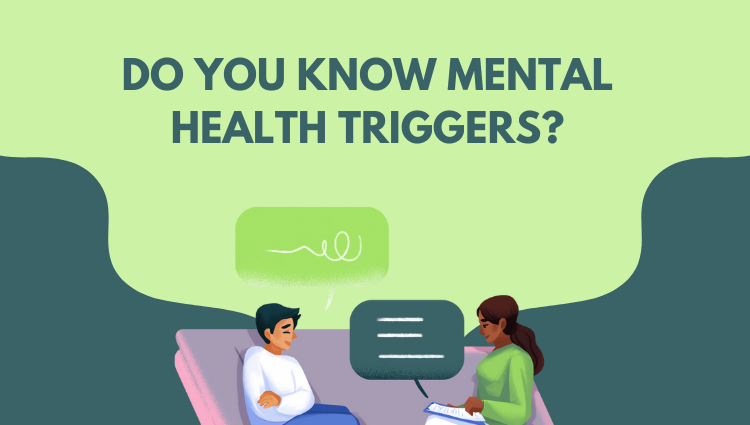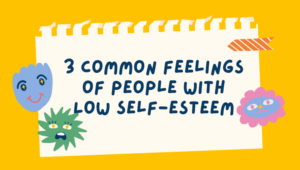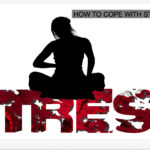In this blog post, we’re going to talk about mental health triggers – what they are, how to identify them, and what to do.

What Are Triggers?
First, let’s define what a trigger is. A trigger is anything that sets off a negative reaction in you. When it comes to mental illness, “trigger” is often used to describe something that leads to or makes symptoms worse. It can be a person, a place, a thing, or even a memory.
Some triggers are obvious, like a person who always makes you feel angry or stressed. Other triggers can be more subtle, like a place that reminds you of a bad experience.
There are a few different types of triggers:
External Triggers
External triggers are things like sounds, smells, or sights that can remind you of a traumatic event. For example, seeing a car accident might trigger memories of a previous car accident you were in. Or, if you are a veteran of war, the sound of fireworks can be trauma triggers.
Internal Triggers
Internal triggers are thoughts or memories that can cause you to feel emotional distress. For example, thinking about a loved one who died might trigger sadness or grief. Also, if you had a negative medical experience in the past, making an appointment with a doctor can trigger fear at the moment.
Interpersonal Triggers
Interpersonal triggers can be defined as any event or situation that causes someone to feel emotionally or mentally unstable. It can be tricky to deal with because they’re not always under our control. Triggers can be anything from a breakup or divorce, to a death in the family, to a change in job or financial status. We can’t always avoid the people or situations that set them off, and we might not even be aware of what our triggers are.
Physiological Triggers
Physiological triggers are things that can cause a physical reaction, like a change in heart rate or breathing. For example, seeing blood might trigger a physical reaction of feeling faint or dizzy. If you have bipolar disorder, changes in your sleep patterns can trigger a manic or depressive episode. If you have schizophrenia, changes in your dopamine levels can trigger psychotic symptoms.
How To Identify Triggers
Here are 2 tips for identifying your triggers.
1. Pay attention to your emotions
For many people, triggers are a part of everyday life. And while they can be helpful in some ways (like alerting us to danger), they can also be harmful.
If you notice that you’re feeling negative emotions more often than usual, there may be a trigger that’s causing them. And while it’s normal to feel emotions like anger, anxiety, or sadness, it’s important to know when those emotions are becoming too much. That’s where triggers come in.
2. Think about what’s going on in your life
If there’s something new or different happening that’s making you feel bad, it could be a trigger.
When we’re feeling overwhelmed, it can be helpful to take a step back and think about what’s really going on in our lives. What are the triggers that might be causing our stress or anxiety?
For me, I know that one of my triggers is when I feel like I’m not in control of my life. When I’m feeling like everything is out of my control, it can be helpful for me to take a step back and remind myself of the things that I do have control over.
Another trigger for me is when I feel like I’m not doing enough. This can be a result of comparison or perfectionism. When I start to feel like I’m not doing enough, it’s important for me to remind myself that I am doing the best that I can.
What To Do When You Identify Triggers
1. Avoid the trigger if possible
When you’re trying to manage your anxiety, it’s important to be aware of your triggers – those things that make your anxiety worse. Once you know what your triggers are, you can try to avoid them if possible.
For some people, their triggers may be obvious – like a fear of flying or public speaking. For others, their triggers may be more subtle – like a certain type of music or a particular smell.
If you’re not sure what your triggers are, it may be helpful to keep a journal of your anxiety symptoms. Write down when you feel anxious, what you were doing at the time, and what you think may have triggered the anxiety.
Once you’ve identified your triggers, you can start to work on avoiding them. If you have a fear of flying, for example, you may want to consider taking a different vacation this year. If you’re triggered by a certain type of music, you may want to avoid listening to that type of music altogether.
Of course, avoiding your triggers isn’t always possible – and that’s OK. If you can’t avoid your triggers, you can still manage your anxiety by learning coping skills. This may include deep breathing exercises, relaxation techniques, or positive self-talk.
2. Prepare for the trigger
If you know what your anxiety triggers are, you can start to prepare for them.
This might mean having a plan for how to deal with them when they come up. It might also mean avoiding certain situations or people that you know will trigger your anxiety.
This can be a difficult task, but it is important to do what you can to avoid the situations that cause your anxiety.
3. Distract yourself
It can be difficult to distract yourself from the trigger, but it is important to remember that the trigger is not the only thing in your life.
If you’re in a situation where you can’t avoid the trigger, try to distract yourself with something else. Find something else to focus on, whether it is a hobby, a friend, or something else that makes you happy.
Don’t let the trigger control your life – you are in control.
4. Talk to someone
Sometimes it can be helpful to talk to someone else about your emotions and experiences. They may be able to help you identify a trigger that you didn’t realize was there.
It’s normal to feel overwhelmed, anxious, or even scared after a traumatic event. You may feel like you’re in shock or that you’re not yourself. These are all common reactions to trauma, and it’s important to remember that there is no “right” or “wrong” way to feel.
The most important thing you can do for yourself after a traumatic event is to talk to someone you trust. Talking about what happened can be incredibly helpful in managing your reactions and beginning to heal.
Conclusion
There are many things in life that can serve as triggers for our emotions. It is important to be aware of what our triggers are, so that we can deal with them in a healthy way. If we can identify our triggers, we can often find ways to avoid them or to manage them better. When we know what our triggers are, we can also be more prepared to deal with the emotions that they may cause.
Triggers are a big part of managing our mental health, so it’s important to understand them.
I hope this article was helpful in understanding mental health triggers.






